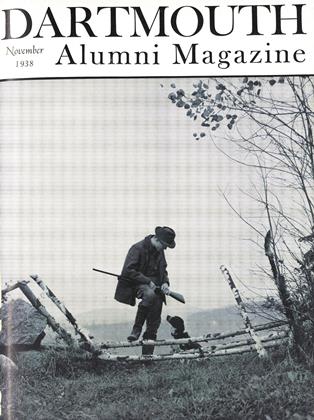To THE EDITOR: I have read carefully those portions of the "Report of the Committee on Student Publications" contained in the Abstracts and Excerpts reprinted from the issues of The Dartmouth for May 23-May 27, 1938. I should like to be counted among the alumni who are opposing the proposal for the appointment of an alumni trustee to deal with the affairs of The Dartmouth.
I write as one who was by no means on the inside of The Dartmouth in his undergraduate days and whose knowledge of the paper since graduation comes largely from the Abstracts and Excerpts. I accept as fact the statements of fact contained in the Abstracts and Excerpts and find myself in general accord with much of the analysis therein contained. When it comes, however, to the principal proposal made, I find myself in shocked disagreement.
The nub of the proposal consists in the suggested appointment of an alumni trustee with very broad powers, powers so sweeping that any but the most unyielding board of editors might readily be reduced to a position of subservience to him. My college generation was taught to believe, and I think rightly, that the prime purpose of any liberal arts college, and of Dartmouth in particular, was the development in each student of an inquiring mind, of a scientific spirit and of an informed and critical intelligence. It was recognized then that such a purpose could not be achieved by shackling the student, that it could be achieved, if at all, only by freely recognizing and encouraging the exercise of his right to the same freedom of expression supposedly accorded the citizens of a democracy. If that attitude was valid then, it is valid today.
It is said that "the outside world regards the publications as official or quasiofficial" and it is argued that therefore control of the publications must be lodged in a College official so that the College will be charged with responsibility only for those matters with respect to which it has actually assumed responsibility. It is doubtless true that many uninformed people regard The Dartmouth as official. This sometimes produces unfortunate consequences for the College. How much more unfortunate would it be, however, to determine that institutional conduct must be regulated according to its effect on the ignorant. The individual who so regulates his life is called a temporizer and is regarded as a person without the courage of his convictions. I think that if the College should accept that principle—the principle underlying the Committee's proposal—it would thereby abdicate one of its most cherished traditions. Dartmouth should attempt to lead, not follow, the multitude.
The tradition of student freedom from administration and alumni restraint was not taken lightly ten years ago. While the incident was not publicized, I recall vividly that an editor of a student publication, an honor student then in his senior year, willingly withstood a threat of expulsion and loss of his degree rather than yield to the intimation of an administrative official that such penalties would be incurred unless he consented to the deletion of certain matter intended for publication. I recall that those of us associated with him ac- corded him the fullest support in the belief that we were upholding a vital tradition of the College.
It seems to me that the Committee's proposal runs counter to these two fundamental principles—the principle of the College's freedom from "the outside world" and the principle of student freedom from unnecessary faculty and alumni restraint. It may be conceded that evils have existed and do exist in the administration of the affairs of The Dartmouth. It seems to me, however, that departure from these principles and acceptance of the Committee's proposal would themselves constitute and produce greater evils.
25 Broadway,New York City,October 10, 1938.
 View Full Issue
View Full Issue
More From This Issue
-
 Class Notes
Class Notes1930*
November 1938 By ALBERT I. DICKERSON -
 Sports
SportsBig Green Teams
November 1938 By "Whitey" Fuller '37 -
 Article
ArticleGradus Ad Parnassum
November 1938 By The Editor -
 Article
ArticleDartmouth's Rebel Saint
November 1938 By ALLAN MACDONALD -
 Class Notes
Class Notes1917
November 1938 By EUGENE D. TOWLER -
 Class Notes
Class Notes1921*
November 1938 By CHARLES A. STICKNEY JR.
Letters to the Editor
-
 Letters to the Editor
Letters to the EditorCOMMUNICATIONS
February 1919 -
 Letters to the Editor
Letters to the EditorFURTHER NEWS FROM CHINA
August 1921 -
 Letters to the Editor
Letters to the EditorLetters to the Editor
JANUARY 1968 -
 Letters to the Editor
Letters to the EditorLetters to the Editor
JUNE 1971 -
 Letters to the Editor
Letters to the EditorLetters to the Editor
April 1979 -
 Letters to the Editor
Letters to the EditorLETTERS
NOVEMBER 1988


